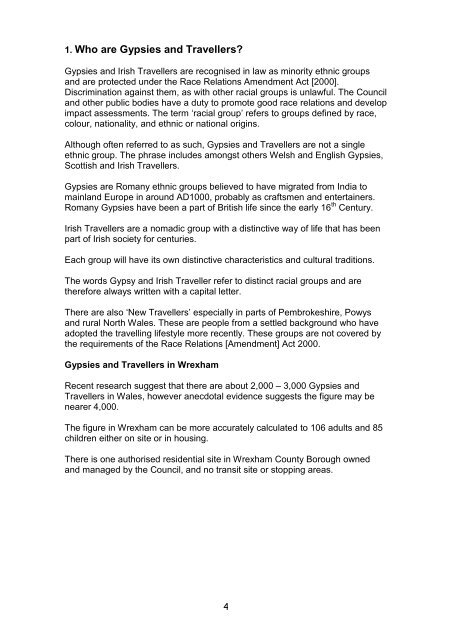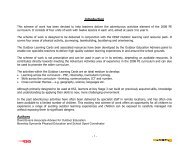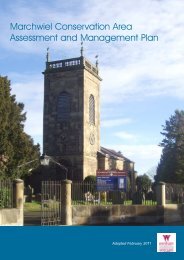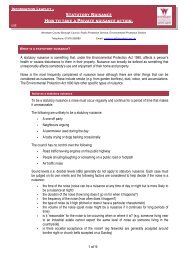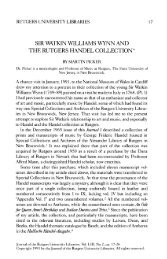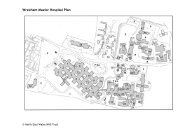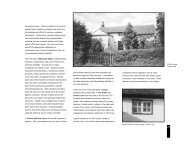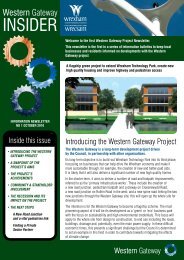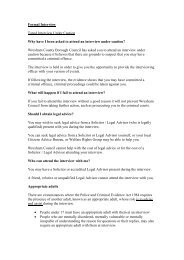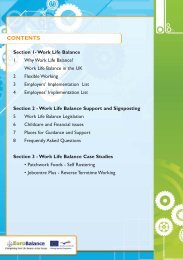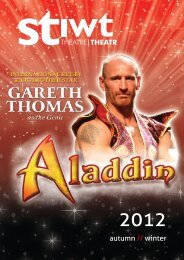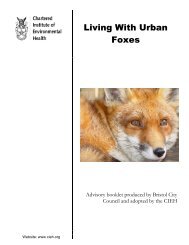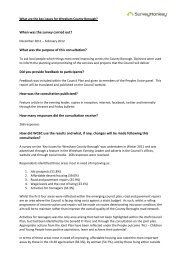Gypsies and Travellers - Wrexham County Borough Council
Gypsies and Travellers - Wrexham County Borough Council
Gypsies and Travellers - Wrexham County Borough Council
- No tags were found...
Create successful ePaper yourself
Turn your PDF publications into a flip-book with our unique Google optimized e-Paper software.
1. Who are <strong>Gypsies</strong> <strong>and</strong> <strong>Travellers</strong>?<strong>Gypsies</strong> <strong>and</strong> Irish <strong>Travellers</strong> are recognised in law as minority ethnic groups<strong>and</strong> are protected under the Race Relations Amendment Act [2000].Discrimination against them, as with other racial groups is unlawful. The <strong>Council</strong><strong>and</strong> other public bodies have a duty to promote good race relations <strong>and</strong> developimpact assessments. The term ‘racial group’ refers to groups defined by race,colour, nationality, <strong>and</strong> ethnic or national origins.Although often referred to as such, <strong>Gypsies</strong> <strong>and</strong> <strong>Travellers</strong> are not a singleethnic group. The phrase includes amongst others Welsh <strong>and</strong> English <strong>Gypsies</strong>,Scottish <strong>and</strong> Irish <strong>Travellers</strong>.<strong>Gypsies</strong> are Romany ethnic groups believed to have migrated from India tomainl<strong>and</strong> Europe in around AD1000, probably as craftsmen <strong>and</strong> entertainers.Romany <strong>Gypsies</strong> have been a part of British life since the early 16 th Century.Irish <strong>Travellers</strong> are a nomadic group with a distinctive way of life that has beenpart of Irish society for centuries.Each group will have its own distinctive characteristics <strong>and</strong> cultural traditions.The words Gypsy <strong>and</strong> Irish Traveller refer to distinct racial groups <strong>and</strong> aretherefore always written with a capital letter.There are also ‘New <strong>Travellers</strong>’ especially in parts of Pembrokeshire, Powys<strong>and</strong> rural North Wales. These are people from a settled background who haveadopted the travelling lifestyle more recently. These groups are not covered bythe requirements of the Race Relations [Amendment] Act 2000.<strong>Gypsies</strong> <strong>and</strong> <strong>Travellers</strong> in <strong>Wrexham</strong>Recent research suggest that there are about 2,000 – 3,000 <strong>Gypsies</strong> <strong>and</strong><strong>Travellers</strong> in Wales, however anecdotal evidence suggests the figure may benearer 4,000.The figure in <strong>Wrexham</strong> can be more accurately calculated to 106 adults <strong>and</strong> 85children either on site or in housing.There is one authorised residential site in <strong>Wrexham</strong> <strong>County</strong> <strong>Borough</strong> owned<strong>and</strong> managed by the <strong>Council</strong>, <strong>and</strong> no transit site or stopping areas.4


